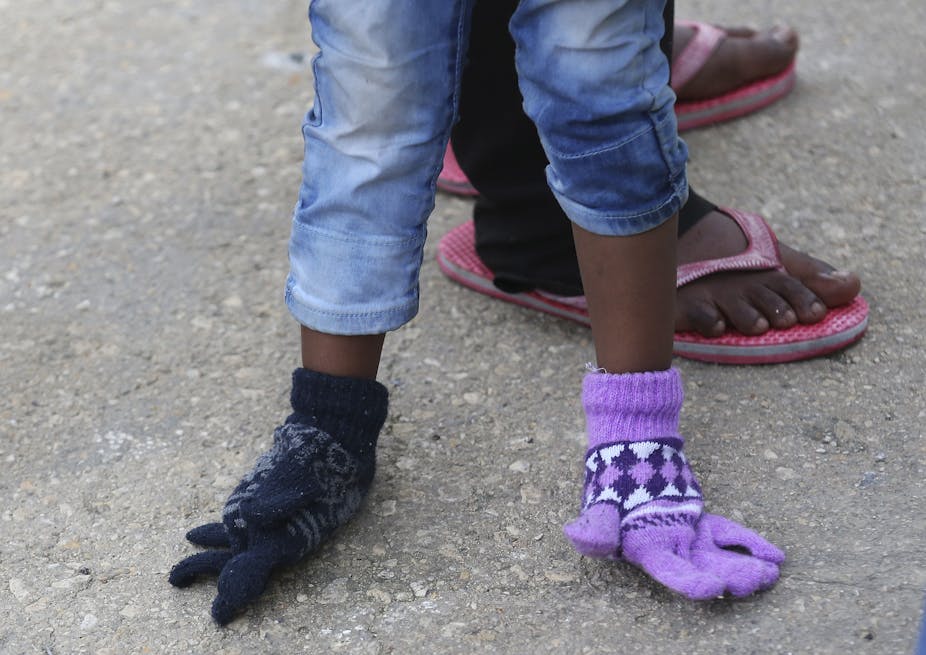George W Bush had a very successful foreign policy. Those are words you don’t often read unedited in that order. But, yes, I wrote them.
No, I am not joining the ranks of the neo-conservatives who popped their heads back above the trench in suggesting that the 2011 Arab Spring was the result of the American invasion of Iraq and that Bush could work with Putin but Obama can’t.
What I am referring to is America’s successful global initiative against human trafficking, one begun by Bush, continued by Obama and that, now, has stalled in the Republican-dominated Senate.
It started with the UN
In a rare coincidence of interests, Bush’s original initiative in 2001 bought together a coalition of liberals and evangelicals. And both groups have remained passionate about cultivating an anti-trafficking agenda - both at home and abroad - on moralistic, criminal, and national-security grounds.
Opposing trafficking is, indeed, still considered as American as apple pie.
Bush’s initiative stemmed from the United Nations’ 2000 Palermo Conference where the UN Convention on Transnational Organized Crime was signed. This included a supplementary protocol that focused on a “Three P” approach to female and child trafficking: protection, punishment and prevention.
Bush decided to press forward aggressively in what remains, effectively, a low-cost but politically rewarding initiative.
Armed with the UN’s approval, and widespread domestic support, Bush set up an anti-trafficking office in the Department of State that has issued an annual Trafficking in Persons (or TIPS) report since 2001.
The TIPS report evaluates the initiatives of every country in the world. Countries are graded and transgressors, where feasible, are bullied, cajoled and even offered assistance.
The goal is to improve their trafficking record – particularly when it comes to the treatment of women and children. To assist them in this task, the State Department has set up a global network in collaboration with over 90 NGO groups, primarily based and staffed by local representatives.
The initiative is interesting because the UN’s mandate allows the US to behave in ways that in other circumstances would axiomatically lead to accusations of undue interference.
Welcoming American involvement
Few countries targeted by the US complain. Because doing so amplifies the fact that they condone or tolerate the trafficking of women and minors. Indeed, many governments gratefully accept American assistance when it comes to implementing anti-corruption measures or teaching programs among the ranks of their own police forces. Local NGOs are keen to work with American officials who organize and fund services for formerly trafficked victims.
And any suggestion that political considerations define which countries get singled out for criticism simply doesn’t stand up to scrutiny.
Sure, the list of perennial transgressors includes adversaries such as Cuba, Iran, North Korea and Russia. But it has also included a series of allies whom the US is generally keen not to offend, like Saudi Arabia.
Last year’s special “watch list” – countries who have been warned and are now being closely scrutinized for their response - even includes Bahrain (the home of the US Fifth Fleet) and Ukraine, a country with whom the US currently shares a particularly close kinship.
President Obama has been as zealous as his predecessor in implementing this initiative.
In 2009 he appointed Luis C deBaca to oversee the State Department’s program. DeBaca is notable for his crusading commitment to the issue. As one commentator suggested:
“If you are a human trafficker or someone who profits from the modern-day slave trade, and you come up against Lou de Baca: God help you…. Saying that deBaca has a vigorous attitude about slave traders is like saying Killer Whales have an affinity for seals. Since 1994, stripping traffickers of their freedom, and restoring that of their victims, has been more than deBaca’s job; it’s been his passion.”
The Senate rears its head
The purpose of this trip down memory lane isn’t simply to point out the significance of a bipartisan legislative initiative.
Nor that Americans of vastly different political persuasions can actually agree on an ethical issue. Nor that there are circumstances where the US can still stick its nose into the affairs of other countries and actually be praised for doing so. Nor, finally, that both Republicans and Democrats can effectively cooperate with foreign NGOs to support basic human rights.
No, my purpose is to point out how out of touch the Senate is with the world beyond the Washington Beltway.
A bill, sponsored by Senator John Cornyn, Republican of Texas, seeks to create a victims’ fund from fines collected from perpetrators of sex trafficking.
It passed the House but Senate Democrats have discovered a provision that stipulates that the fees from the fund cannot be used to pay for abortions – for victims of sex trafficking.
Presumably, its advocates are the same people who oppose abortion under all circumstances except, perhaps, an imminent danger to the health of the mother – because being enslaved and used for sexual services clearly constitutes an act of rape. Worse, as we now know, the bill’s passage is now tied to the approval of Loretta Lynch as the first African American Attorney General. So the whole legislative approval process has ground to a halt.
We have spent a lot of time recently wondering what the Iranian leadership thinks of the Congressional Republican leadership.
Even more surreal, perhaps, I wonder what George W Bush thinks of Congressional Republicans as they assault this initiative?
After all, if they are willing to subvert part of an program that has won America enormous approval at home and abroad and one that even evangelicals have enthusiastically and unconditionally supported for fifteen years without rallying over abortion rights for rape victims, then what can the average American voter be thinking?

